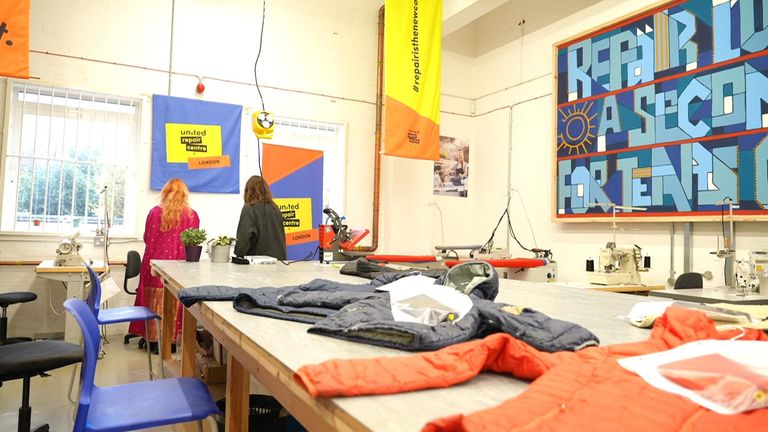At a clothes factory in Haringey, north London, seamstresses are sewing vintage-style dresses, cycling shorts and graduation gowns.
For twelve years, the factory’s 45 machinists have been making clothes for brands like ASOS and Community Clothing. At the beginning, they were sewing over 10,000 garments a week – now, they make less than half of that.
A combination of companies using cheaper factories abroad and wanting smaller runs to reduce waste meant the factory was falling on hard times.
Chief executive Jenny Holloway is determined not to make anyone redundant – so she’s pivoted. Instead of making clothes, 15 of the factory’s machinists are repairing them next door – by 2025, they’ll be repairing 30,000 garments a year.
Inside the repair centre, Jenny’s excited. “This is the future that you’re seeing here. We should be getting every day of a life of a garment. We should not be throwing garments away.”
The idea is simple – when your clothes get torn or a zip breaks, you don’t replace the whole thing, you just send it back to the manufacturer. They then give it to this team of machinists who get it looking as good as new.
Tailors, dress agencies and dry cleaners will generally all do repairs but it’s the scale of things at the United Repair Centre that sets it apart.
Brands like Patagonia, Lulu Lemon and Decathlon are already using its Amsterdam branch to repair tens of thousands of garments a year.
Read more:
Adidas loses court battle over stripe design
Lockdown turned Britons against fast fashion
At the moment, outdoor clothing brand Patagonia is making use of the London repair centre. Alex Beasley, who manages Patagonia’s business in the UK, Ireland and Nordics, believes repairing your clothes is about more than just making them last longer.
“Repair is a radical act. Just by that simple act of repairing rather than buying new, you’re pushing back against the system that defines us as consumers [instead of citizens]; it helps us to reduce consumption.”
We use five times more clothes than we did two decades ago, and clothing companies are creating more than one million garments every single day.
One repair centre isn’t going to stem the tidal wave of dresses, shirts and socks but the co-founders here are seeing it as the start of something much bigger.
“We believe that repair and reconditioning of clothing is at the core of the change of the fashion industry,” says Paul Kerssens, Chief Operating Officer at the United Repair Centre.
“So it is our ambition to really make the system change. And the centre here in the UK, we’re starting small, but our ambitions are big.”
Checkout latest world news below links :
World News || Latest News || U.S. News
The post ‘Repair is a radical act’: London factory to reduce waste by renewing 30,000 garments a year appeared first on WorldNewsEra.

